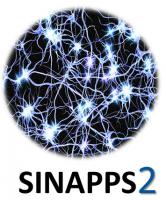
SINAPPS2
A randomised phase II double-blinded placebo-controlled trial of intravenous immunoglobulins and rituximab in patients with antibody-associated psychosis
Research summary
Psychosis and schizophrenia are caused by factors associated with excess dopamine and abnormally low N-methyl D-aspartate receptor (NMDAR) functioning. There is increasing evidence for the role of inflammation in these disorders. We propose that one possible cause of psychosis and schizophrenia is the presence of antibodies in the blood that bind to the neuronal membrane in the brain. Since discovery of antibodies that bind to the NMDAR (NMDAR-ab) that cause encephalitis, we have discovered NMDAR-ab or voltage-gated potassium channel complex antibodies (VGKC-ab) in 6.5% of first episode psychosis (FEP) patients, without signs of encephalitis. This was replicated in an on-going MRC-funded study, where 8.8% of FEP patients possessed these autoantibodies.
Open-label experience suggests immunotherapy is effective in cases of full antibody-encephalitis. We recently reported on 18 patients with NMDAR-ab; 9 resolved on their own, or responded to antipsychotics, and 9 were resistant to up to 3 antipsychotics. Antipsychotic resistant patients were treated with corticosteroids alongside immunotherapy (plasma exchange (PLEX) or intravenous immunoglobulin (IVIG; a blood product containing antibodies), with subsequent mycophenolate or rituximab treatment), and responded well.
Informed by our feasibility study, this randomised double-blinded placebo-controlled trial aims to test the hypothesis that immunotherapy is an effective treatment for antibody-associated psychosis, either in FEP or relapse following remission, alongside antipsychotic medication if required. Trial immunotherapy consists of IVIG (2g/kg over 4 days) followed by two infusions of 1g rituximab(~day 30, then 14 days after the first infusion). This trial combines a rapid-action treatment (IVIG) to induce symptom remission, with a longer-action therapy (rituximab) to maintain remission. Before treatment, a number of assessments will be performed, including physician review and examination, laboratory investigations (including Ab-assays and safety blood tests and storing serum for future research), as well as clinical and cognitive assessments.
Main inclusion criteria
To be included in the trial the patient must have all of:
• An episode of acute psychosis for at least 2 weeks (defined as symptomatic on the PANSS, at least one of item score 4 or more on P1, P2, P3, N1, N4, N6, G5, G9).
o This may either be a first episode or relapse after remission (remission is defined as having mild or absent symptoms of psychosis for at least 6 months.
• Serum or CSF anti-neuronal membrane autoantibodies at pathological levels (including NMDAR, LGI1 and other) within 2 months.
• Aged 16-70 years.*
• Patient or Legal representative is willing and able to provide informed consent
* Participants between 61-70 years of age and with both doses of COVID-19 vaccine can be included in the trial.
Main exclusion criteria
The presence of any of the following will preclude patient inclusion:
• Duration of current episode of psychosis greater than 24 months.
• Alternative co-existing severe neurological disease, including tumour, hippocampal sclerosis with refractory epilepsy, probable dementia with evidence of atrophy on brain imaging, moderate or severe learning disability.
• Any evidence of a current acute encephalopathy (for instance coma, seizures).
• Hepatitis B, Hepatitis C or HIV positivity.
• IgG level <3g/L.
• Previous malignancy (to be usually excluded unless agreed with CI).
• Pregnant, breast feeding or inadequate contraception if female.
• Hypersensitivity or absolute contra-indication to any trial drug, murine proteins or excipients.
• Previous treatment with rituximab in the past 12 months.
• Severe infection.
• Severe heart failure.
• Any other medical illness or disability that, in the opinion of the investigator, would compromise effective trial participation.
• Risk factors associated with COVID 19 that in the opinion of the investigator would lead to unacceptable risks to trial participation
• Concurrent enrolment in another CTIMP(s)
Funders and sponsors
Funders: Medical Research Council
Sponsors: Cambridge University Hospitals NHS Foundation Trust and University of Cambridge
Chief investigator
Prof Alasdair Coles
Contact details
Clinical Trials Coordinator: Suhaylah Bhatti
Email: [email protected]
Clinical Trials Manager: Francis Dowling
Telephone: 01223 254666 | Email: [email protected]






